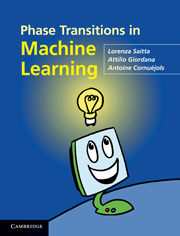
-
Select format
-
- Publisher:
- Cambridge University Press
- Publication date:
- 05 August 2012
- 16 June 2011
- ISBN:
- 9780511975509
- 9780521763912
- Dimensions:
- (246 x 189 mm)
- Weight & Pages:
- 1.1kg, 410 Pages
- Dimensions:
- Weight & Pages:
You may already have access via personal or institutional login
Book description
Phase transitions typically occur in combinatorial computational problems and have important consequences, especially with the current spread of statistical relational learning as well as sequence learning methodologies. In Phase Transitions in Machine Learning the authors begin by describing in detail this phenomenon, and the extensive experimental investigation that supports its presence. They then turn their attention to the possible implications and explore appropriate methods for tackling them. Weaving together fundamental aspects of computer science, statistical physics and machine learning, the book provides sufficient mathematics and physics background to make the subject intelligible to researchers in AI and other computer science communities. Open research issues are also discussed, suggesting promising directions for future research.
Reviews
"... it is still an open question whether this will be one of the basic tools for understanding machine learning problems and methods in the future. Naturally, this book is an essential source for researchers who want to find answers to these questions."
Joe Hernandez-Orallo, Computing Reviews
Contents
Metrics
Altmetric attention score
Full text views
Full text views help Loading metrics...
Loading metrics...
* Views captured on Cambridge Core between #date#. This data will be updated every 24 hours.
Usage data cannot currently be displayed.
Accessibility standard: Unknown
Why this information is here
This section outlines the accessibility features of this content - including support for screen readers, full keyboard navigation and high-contrast display options. This may not be relevant for you.
Accessibility Information
Accessibility compliance for the PDF of this book is currently unknown and may be updated in the future.


